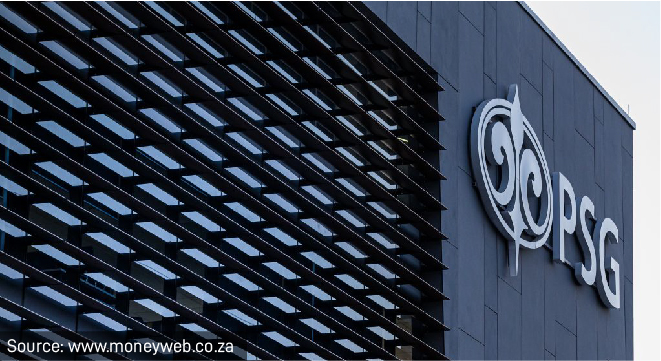The PSG Group plans to unbundle its investments and delist from the JSE in an attempt to reduce the 30% discount at which its shares trade to the value of the group’s underlying investments, thereby unlocking value for its shareholders.
PSG’s shares shot up from R81.83 on 28 February to close at R97.15 after the unbundling announcement on 1 March. They were trading at around R92 on Monday, 7 March.
In the SENS announcement, the group said it intends to unbundle its stakes in subsidiaries PSG Konsult, Curro, Kaap Agri, CA&S and 25.1% of tertiary education company Stadio.
Thereafter, PSG will make a cash offer to shareholders to acquire their shares for R23 per share, at an estimated cost of R3.4 billion.
Shareholders including management (5.2%), the founding family (20.1%) and immediate family members are excluded from the offer, because they will remain invested in the unlisted and smaller PSG.
According to PSG, the combined value of the unbundling and the cash repurchase will amount to about R114 per share, representing a 38.4% premium to the PSG Group’s share price of R82.31 when the JSE closed on Friday, 25 February.
The reduced and unlisted PSG will retain its unlisted investments in the venture capital arm PSG Alpha, its remaining investment in Stadio, and 48.6% of Zeder. It will be worth about R2.5bn, far less than its current market capitalisation of R18.2bn.
The proposed unbundling will be PSG’s second recent value-unlock initiative. In 2020, the group unbundled Capitec, unlocking about R21bn, or R94.48 per share, for shareholders.
PSG was founded in November 1995 by Jannie Mouton and Chris Otto with the aim of creating a financial services conglomerate. However, it has evolved to resemble a diversified holding company.
‘Investment holding companies out of favour’
Explaining the reasons for the proposed unbundling PSG Group chief executive Piet Mouton (Jannie’s son) said investment holding companies currently trade at substantial discounts to fair value with the average discount being more than 40%. This was not only a South African phenomenon, but globally the investment holding company vehicle appears to have fallen out of favour, with private equity funds and unit trusts taking preference.
In addition, investors seem to prefer to be directly invested in operational companies rather than through an investment holding entity.
“The simple fact is that the large investment holding company discounts negate one of the primary reasons to be listed, being one’s ability to raise capital in the equity markets.
“If an investment holding company was to raise R100 while trading at a 30% discount, it would be worth R70 immediately thereafter – that is serious value destruction! This leads to investment holding companies hoarding cash for potential future transactions, thereby becoming significantly more conservative; however, cash diminishes returns and combined with greater conservatism in managing the portfolio, it reinforces the discount principle,” said Mouton.
PSG Group said it believes the proposed transaction provides an eloquent solution to resolve the discount conundrum, given that shareholders receive a significant premium to the current share price.
In addition, by taking PSG Group private, it should significantly alleviate the regulatory compliance burden associated with being listed and allow management to focus on business.
“The companies which we are unbundling all have exceptional management teams, experienced boards, are well-capitalized, and have exciting growth prospects,” Mouton said.
“We believe they will benefit from greater liquidity and their chances of being included in indices should improve significantly as a result of their larger free float. Furthermore, the founding shareholders have committed to retain their shares in these unbundled companies. Simply put, these companies are an intricate part of what made PSG Group, we believe in them and their prospects, and we intend to hold onto our direct shareholding going forward.”
The transaction is subject to, among other things, shareholder and regulatory approvals. Once a final announcement is published and if there are no major delays, the transaction should be concluded towards the end of August.



